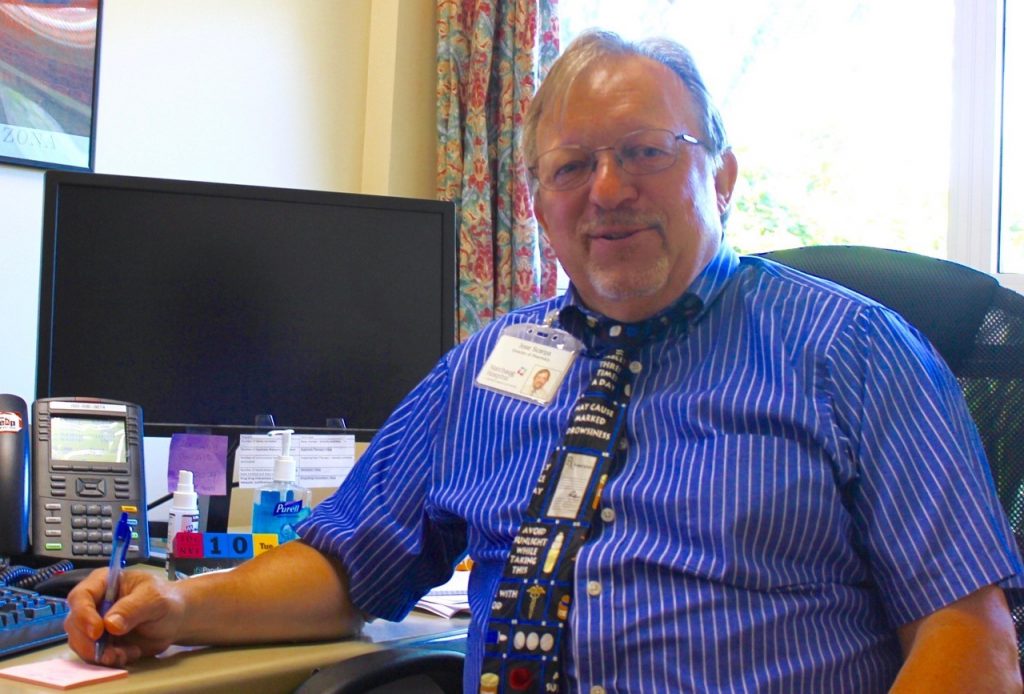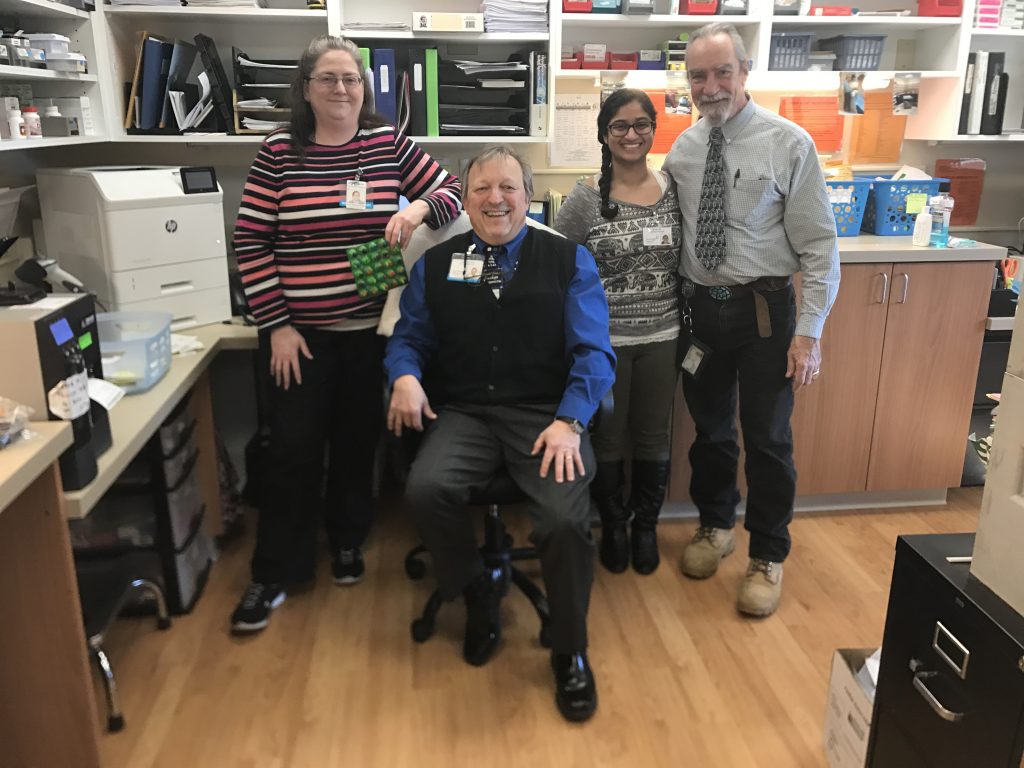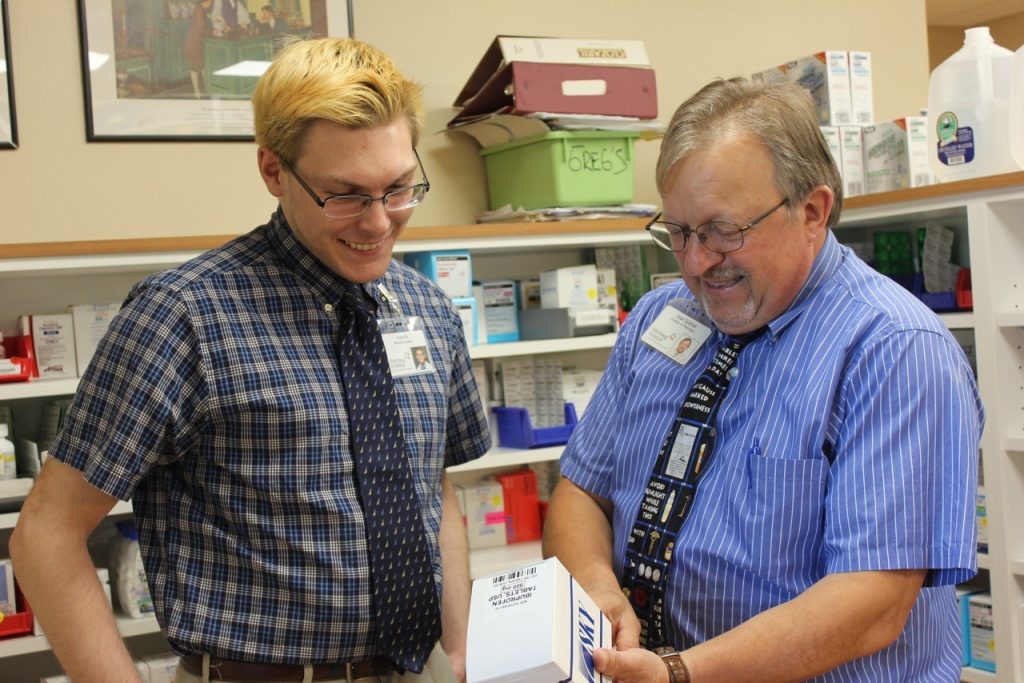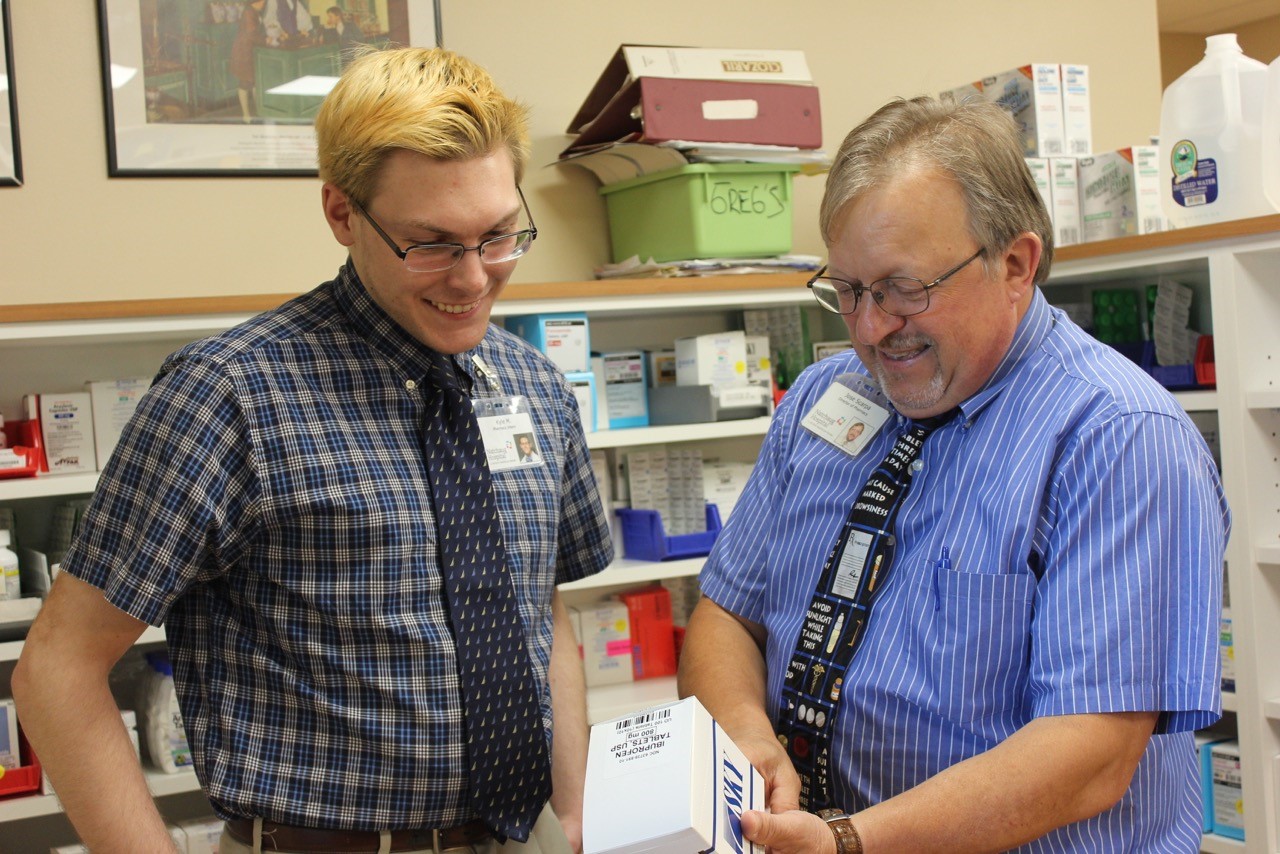Today we begin a series about UConn School of Pharmacy practice experiences and the preceptors that play vital roles in pharmacy education.
What’s a School of Pharmacy preceptor?
Quick overview: In a pharmacy student’s first professional year (P-1) students spend between 100 – 130 hours working in community pharmacy settings as part of their Introductory Pharmacy Practice Experience (IPPE).
The second professional year, as P-2s, the same number of hours are spent in institutional settings, like hospitals and clinics. Additional hours in the third, or P-3, year are devoted to service learning experiences. By the end of their first three years, students have a total of 300 IPPE hours under their belts and they are on the home stretch to earning their Doctor of Pharmacy degrees.
In their fourth (P-4) year, students spend nine months rotating through four required and five elective Advanced Pharmacy Practice Experiences. These APPEs set the stage for future career decisions.
Preceptors: During rotations through each experience, students work under the direction of preceptors (at over 85 locations in any given month). The dictionary definition says the word preceptor means teacher, or instructor. However, to legions of UConn School of Pharmacy graduates, the definition often extends to words such as mentor, friend, and role model.
Meet Mary Morytko, puzzle master.
Mary Morytko is the Field Coordinator of Experiential Education at the School of Pharmacy and connects students with pharmacy related preceptors at each experience. She is responsible for matching students with preceptors and rotations. Fortunately, she is somewhat of a puzzle master.
“Matching students to preceptors, making sure they are including the mandatory rotations in Community Practice, Ambulatory Care, Institutional Pharmacy, and General Medicine, and then talking about career goals and the best choices for elective rotations is time consuming, but it’s also really rewarding. It’s what prepares students for their future careers in pharmacy,” says Morytko.
UConn has about 1400 preceptors on board, including those from out of State, as well as faculty in the School of Pharmacy who serve in that capacity in addition to their regular duties. Together, they represent all the key areas necessary for students to complete their Pharm.D. requirements.

Preceptor/practice profile:
José Scarpa ’88 (Pharm), Director of Pharmacy, Natchaug Hospital.
José Scarpa, is a board certified psychiatric pharmacist who serves as Director of Pharmacy at Natchaug Hospital, a 57-bed psychiatric hospital in Mansfield Center, Conn. He’s been at Natchaug since 2005, following a 20-year career at Manchester Memorial Hospital. Right after he assumed his current position, Scarpa let his Alma mater know that he was interested in becoming a preceptor because, in his words, “This is a profession where we ‘give back’ and help each other whenever we can. Plus, I really enjoy working with students. Sometimes I think I learn as much from them as they do from me.”
Scarpa can best be described as organized, outgoing, and a self-described people person. He speaks with a trace of an accent from his native Uruguay, a country he left at age 18 intending to briefly visit with relatives in southwestern Connecticut prior to beginning medical studies ‘back home’.
But, life intervened. First, he fell in love with the culture of the United States, and then he fell in love with the girl who would later become his wife, Eny. Along the way, he changed his career goals from medicine to pharmacy, and that is how he ended up attending UConn where he earned his BS in pharmacy in 1988.
It was during his time at Manchester Memorial that he first realized his passion was working with psychiatric patients. He says, “We had a director of pharmacy who believed in letting us rotate through all the service areas in the hospital. From oncology to maternity to the ICU and so forth. When I started in the psychiatric unit, I knew I’d found my passion. I have also always been interested in pain management, and both areas seem to be compatible in their treatment methods.”

Scarpa was named Institutional Preceptor of the Year in 2014, and current and former students attest to his dedication.
Student reviews.
When she was a P-2, Vinita Mistry, ’19 (Pharm.D.) completed an IPPE rotation at Natchaug.
“I couldn’t have asked for a better preceptor than Jose’. This was an exceptionally busy time at the hospital because the pharmacy was introducing a new computer system and moving to new quarters. And, I was totally new to the situation. Jose’ gave me projects to do, he included me on rounds, and he showed me how pharmacists can make a real difference in people’s lives.”
In fact, Mistry enjoyed her experience so much that she worked for Scarpa on a part time basis for two years after completing her rotation. She says that while she is ultimately interested in working with a geriatric population, she will use what she learned under his tutelage in her career, since psychiatric care often constitutes a significant part of treating the elderly.
Current P-4 Kyle Margison ’19 (Pharm.D.) has plans to go into community pharmacy after graduation, said he chose to do an elective rotation with Scarpa because, “Out of all the clinical courses I’ve had, psychiatry really interested me. This is a great opportunity to take what I learned in the classroom and put it into action.”
Even though newly arrived at the hospital, he was given a couple of independent projects by Scarpa, including compiling a ‘pocket guide’ on long-acting, intramuscular anti-psychotic drugs, including dosing, duration of administration, and approximate costs. The guide will be available to the prescribing physicians associated with Natchaug.

Trusting his students with independent action is something that Scarpa believes in. He says, “I have found that the UConn students who come here are really well prepared academically and socially. They are very focused, and I can honestly say there has never been a time when I’ve been tired of being a preceptor. When someone is shadowing you, it’s almost like an extension of you – I enjoy it tremendously.”
He also gives a nod to his employer, saying that the entire staff at Natchaug Hospital welcomes pharmacy students and that these folks are “instrumental in a student’s experience.”
Scarpa, who also serves on the School of Pharmacy’s Advisory Committee, returns Morytko’s admiration saying that one of the things that makes the preceptorships ‘work’ is the involvement of the Office of Experiential Education in sending great students his way. “I know how dedicated and invested the Office is in seeing students succeed. I can feel their passion from here.”
It is a little like a mutual admiration society, or maybe ‘what goes around, comes around’ fits. In any case, preceptors are an important part of an education at UConn School of Pharmacy and it is clear that the relationship works for all concerned.



